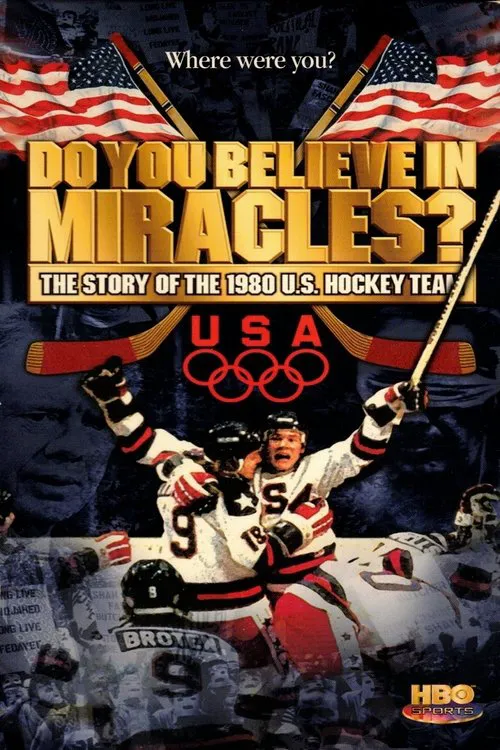Do You Believe in Miracles? The Story of the 1980 U.S. Hockey Team

Plot
In the midst of escalating Cold War tensions, the world witnessed a David and Goliath showdown at the 1980 Winter Olympics in Lake Placid, New York. The United States men's ice hockey team, comprising amateur and collegiate players from across the country, found themselves facing off against the mighty Soviet Union hockey team, who had proven unbeatable in international competition for nearly three decades. The seemingly insurmountable odds inspired the question: "Do you believe in miracles?" - a phrase that would become synonymous with a dramatic chapter in American sports history. As winter snows began to fall in February 1980, the US Olympic hockey team was hastily assembled from a pool of college players, including Mike Eruzione, John Harrington, and Steve Christoff, all selected through a talent search led by Herb Brooks, a former University of Minnesota hockey coach. Brooks' unorthodox approach would push these young, often raw, athletes to their limits as they embarked on an historic underdog journey. At a time when the Soviet Union was at the height of its global power, the stakes were far more significant than mere sporting glory. The United States, struggling through an economic downturn and grappling with social unrest, sought to regain a sense of national pride. As tensions between East and West continued to escalate, the possibility of a Soviet victory seemed a foregone conclusion. Despite initial doubts about the team's chances, Brooks instilled a strong sense of camaraderie and determination within the squad, relying on their unbridled enthusiasm and teamwork to compensate for their relative inexperience. He constantly pushed his team to be the best, implementing a relentless training regimen that would wear them down in body and spirit. Meanwhile, the Soviet Union's hockey team, led by the inimitable coach Viktor Tikhonov, entered the Games with an aura of invincibility. With a roster featuring Olympic champions from four prior games, the Soviets had won all but one international match since 1960, with an astonishing 27 consecutive victories under their belt. Their formidable squad boasted a plethora of world-class talent, including Hall of Famers like Boris Mikhailov and Aleksandr Maltsev. As the Olympics' Group Stage progressed, both teams demonstrated exceptional skill on the ice. The US and Soviet Union hockey teams were joined by other strong contenders, such as Czechoslovakia, Sweden, and Finland, in an increasingly competitive pool. Despite initial jitters and doubts, the US squad gradually began to gel, buoyed by their growing confidence in each other's abilities and Brooks' coaching. Their Group Stage campaign culminated in a showdown against the Canadians, who had long dominated North American hockey. The US team, bolstered by a spirited performance from 18-year-old phenom Rob Suter, emerged victorious in a nail-biting 4-2 win. However, it would be a hard-fought 5-1 triumph over Czechoslovakia in the Semifinals that truly showcased the US squad's emerging prowess and grit. The much-anticipated Soviet Union showdown loomed large on the calendar. As the world held its collective breath, these two mighty hockey teams clashed in one of the most epic showdowns in Olympic history. The stage was set for an unforgettable, edge-of-your-seat match at the Herb Brooks Ice Arena in Lake Placid's Olympic Arena, with the fate of Olympic Gold hanging precariously in the balance. On the morning before the semifinal match, Brooks delivered a stirring speech to his team, reminding them of their dreams, their sacrifices, and the opportunity to make history. He exhorted them to believe in their abilities and trust in each other. The message resonated deeply within the team, imbuing them with an unshakeable sense of resolve as they prepared to face the behemoth that was the Soviet Union hockey team. In the climactic final minutes, the US team, driven by Mike Eruzione's unforgettable goal with 10 minutes remaining in the match, ultimately secured an astonishing 4-3 victory over the Soviet Union. Pandemonium erupted within the packed arena as the US team, awestruck by their own achievement, celebrated this incredible upset. The US team's improbable triumph sent shockwaves across the globe, galvanizing national pride and injecting fresh life into American sports lore. This momentous upset transcended the realm of athletic competition, embodying the hopes and aspirations of a nation yearning for unity and resilience. The 1980 US hockey team's victory will forever be remembered as a "Miracle on Ice," an unforgettable exemplar of courage, perseverance, and unwavering faith in the face of overwhelming adversity. In the aftermath of this extraordinary victory, the US hockey team's players were thrust into the spotlight, gracing the covers of newspapers and magazines worldwide. Though the Soviets continued to dominate international hockey in subsequent years, their Olympic loss served as a catalyst, fueling an American passion for ice hockey that has endured to this day. The lasting impact of the 1980 US Olympic hockey team extends far beyond the confines of the ice rink. As a potent symbol of American determination and national pride, their incredible achievement continues to inspire generations of athletes, sports enthusiasts, and individuals worldwide.
Reviews
Recommendations



